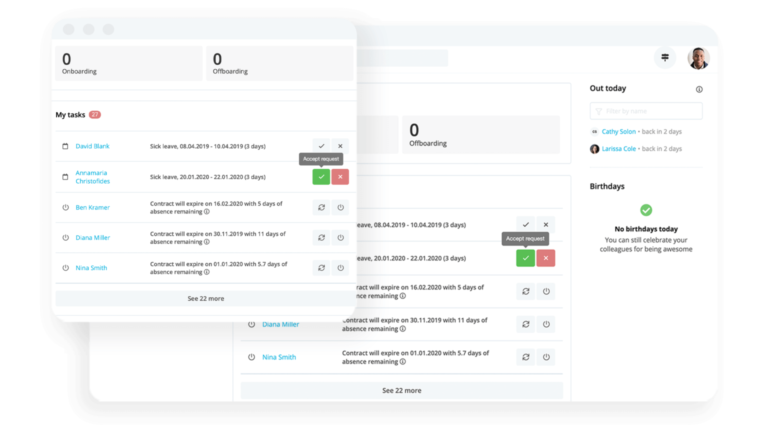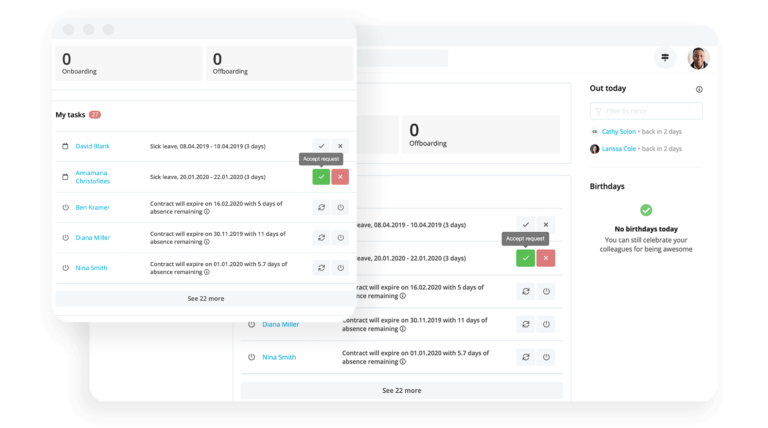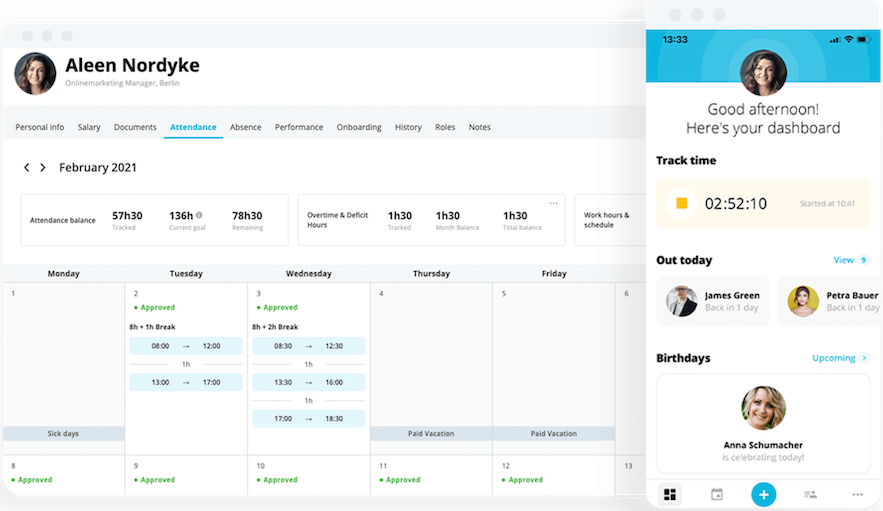10. February 2023
HR's key role in digital transformation

HR digital transformation may sound daunting, but it is well worth the effort. By leveraging more digitised and automated processes, you can drive higher productivity across your entire org -- while empowering your HR team to create more impact.
In this article, we are talking all things digital transformation in HR. That includes what it is, why it matters and some of the key ways to make it work. We hope you enjoy!
What is HR Digital Transformation?
HR digital transformation is an organisational initiative that replaces manual, paper-based practices with digitised, automated processes. The point of digital transformation in HR is to increase organisational productivity en masse, and fast.
Some of the most common ways that an HR department digitally transforms includes:
In how they collect employee data
How data is kept and stored
The way they run automated performance cycles
Through how their onboarding processes run
As we will discuss today, HR digital transformation has become table stakes for successful organisations. You need to have some semblance of digitisation in order to deliver success at scale, across your entire organisational structure.
Why Does Digital HR Matter?
Let's take a quick step back. Are you skeptical of the need to digitise your HR in the first place? It's one thing to talk about transformation, but that comes with it a lot of questions, a lot of tasks and a lot of decisions to be made. Let's try to make it easier on you.
Making the decision to digitally transform your HR is a boon to your organisation. How?
First, it helps streamline your processes. It mades control to what can often feel like chaos, and helps employees understand where they stand in the organisation.
Next, it opens up time for your HR team. When you have all of your processes down pat, you can focus on creating more impact with bigger projects.
Then, it helps boost productivity and engagement across your organisation. When your HR team has time, they can focus on what really matters: your people.
Digital transformation in HR is more of an inflection point. It helps show to your staff, your managers and your board, that employees matter and that you will only get as far as they can carry you. So, you need to focus on their employee experience.
An HR digital transformation can be a moment in time that drastically re-orients your organisation. Often, and when done right (and with the right partner), for the better!
Why Should Digital Transformation Start in HR?
In short, HR digital transformation is organisational transformation. Because HR has such an influence across the entire organisation, starting your digital transformation in HR can have an exponential influence on the rest of your organisation.
Essentially, your HR or People function is a multiplier. They create processes that affect, directly or indirectly, every employee in your organisation. When it comes to something positive, like digital transformation, you should leverage them.
What Does the HR Digital Transformation Process Look Like?
Quickly, we will outline the process for successful leading digital change in your organisation. Here are the steps you should be following:
Assessing Your Needs - What are you looking to do? Which processes would you like automated? Is there anything else you need now or into the future?
Find A Partner - Partner up with a great HR software or solution that can not only meet your needs, but help guide you in the process.
Implement Quickly - Embed your new solution and ways of working into your organisation with a concrete HRIS implementation plan that doesn't waste time.
Track Adoption - Ensure people and employees are using your new ways of working, like requesting holiday digitally, and not going back to the old ways.
Reward Adoption - Think about ways to recognise and reward your true "Digital Transformation Champions", whether they are employees, managers or executives.
Build New Programs - Take the time you have saved to outline new projects that can help build out your overall HR strategy.
Four Keys to an Exceptional HR Digital Transformation
What does it take to create a great digital transformation in HR? Given our experience and expertise, here is what we can recommend...
Key #1: Prepare Your Employees First
A tool or solution only gets as far as its users. If you want to transform the way you work, you definitely need to loop in your employees and line managers as key stakeholders.
This is the part where great change management comes into play. After all, you need to prepare your employees to change the way they work.
First and foremost, the solution you choose to complete your digital transformation in HR needs to be a user-friendly HR software. Your employees need to understand it, and use it, because adoption rates matter greatly when it comes to digital transformation.
Key #2: Leverage Employee Data for Key Decisions
Digital transformation relies on data.
If you want to ensure that your HR digital transformation is a success, you will want to leverage employee data before, during and after the process.
Let's outline how that might look:
Stage | Explanation |
|---|---|
Before Transformation | Conduct employee surveys to hear directly from your people which HR processes are causing them pain or frustration. What would they want to see improved in their day-to-day working lives? |
During Transformation | Keep a close eye on adoption rates, who is using the platform and who could be using it more. Check in with people, run a focus group or a large-scale survey that tracks sentiment of employee net promoter scores (eNPS). |
After Transformation | Any solution you use to help with your digital transformation should offer some kind of access to employee analytics and reporting. This can help take your HR work to a whole new level |
15,000 organisations trust Personio for this reason

Just like LUSH and Premier Inn, trust Personio's all-in-one HRIS to upgrade your people operations for now and into the future. Click below to learn more about us.
Book Your DemoKey #3: Question & Build More Efficient Processes
The time of digital transformation is often an HR teams golden opportunity to question whether or not their existing HR processes are fit for purpose.
Ask yourself:
How are you currently tracking holiday?
How do employees log their time?
Which data security and compliance measures are you taking?
How long does it take to hire a new employee?
Digital transformation in HR is not so much a 'reset button' but a 'pause' in how you work. You can take a break and take stock of your current processes, how they are working and whether they are working at all.
And, then, with the help of a partner, design new ones! Think about ways to support your organisational complexities with custom processes that are better suited to the needs of your employees now and into the future.
Key #4: Find a True "Partner in Crime"
We mentioned it earlier, but it needs to be said again: in order for digital transformation in HR to succeed, you need to have a stronger partner by your side.
In a study conducted by Bitkom and Personio, HR teams in the UK who worked with digital solutions to support their administration and reporting, etc. stated that they were not only better able to master crises, they also tended to be strategically better prepared for their subsequent recovery.
Ensure that, with whatever solution you choose, you make them your “partner in crime” who has your back throughout periods of change and who’s there for you when things get hectic, complex or confusing in your everyday work.
If you do this successfully, you’ll handle your HR digital transformation mission confidently.
Personio: A Leader in HR Digital Transformation
WATCH: Get to know Personio in three minutes

We need your consent to load this service!
This content is not permitted to load due to trackers that are not disclosed to the visitor.
Personio is an all-in-one HR software designed for every stage of the employee life cycle.
Using Personio, you can manage all your most important HR processes from one place. Recruit, manage, develop and pay your employees from one centralised HRIS.
For HR professionals, you can unlock new levels of productivity and influence. Become the HR business partner that your business needs, by getting back time for what matters: your people.
For line managers, Personio seamlessly builds automated performance cycles, tracks vacation days and keeps employee information up-to-date (and in a compliant fashion).
For employees, no more fussing with cumbersome tools and processes. Employees can request days off, change their information and keep track of goals and more. All from one place.
Speak with an expert today about your HR needs and how Personio can meet them. Or, give Personio a spin for yourself by starting your very own free trial right now. It’s all yours for 14 days.

